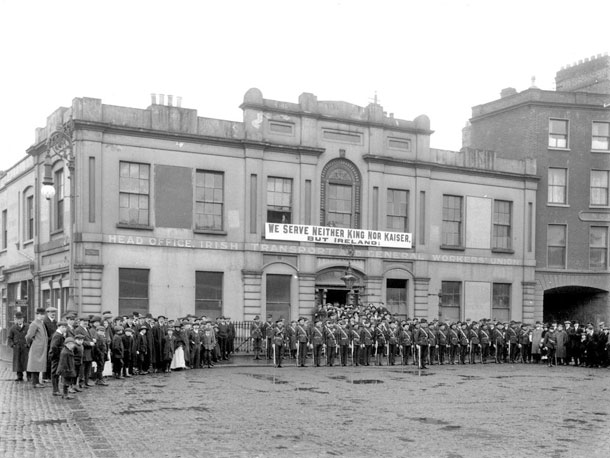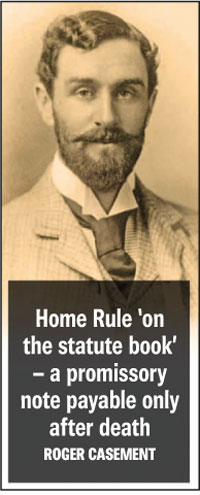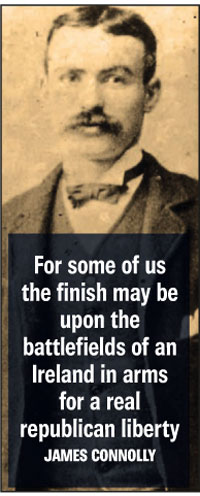1 September 2014 Edition
Escalating war and preparing revolution
Remembering the Past

• The Irish Citizen Army at Liberty Hall with the banner placed by James Connolly in the autumn of 1914
THE OUTBREAK of the First World War had a profound effect on Ireland. Republicans and advanced nationalists prepared to make “England’s difficulty Ireland’s opportunity”. The Home Rule party began recruiting for the British Army, and the Irish Volunteers split. To give a sense of the pace of events we present them in chronological order.

4 to 13 September
Fierce fighting in northern France sees the halting of the German offensive and the failure of their plan to quickly take Paris. This will lead to stalemate on the Western Front and a war bogged down in trenches with millions of soldiers facing mechanised slaughter. The British war machine requires ever greater numbers of men to fight – including Irishmen.
9 September
The Supreme Council of the Irish Republican Brotherhood, including future 1916 Rising leaders, meet at 25 Parnell Square (Conradh na Gaeilge) with key figures in republican, nationalist and labour movements to agree in principle to use the war to strike a blow for Irish freedom. Those present include Pádraig Pearse, James Connolly, Seán Mac Diarmada, William O’Brien (ITGWU) and Arthur Griffith.
18 September
In the House of Commons in London, it is announced that the Third Home Rule Bill, to be known as the Government of Ireland Act 1914, has received the “royal assent” – i.e. was signed by King George V, making it law. But the king also signs a Suspensory Act, suspending Home Rule until after the war. And, crucially, the British Government remains committed to the partition of Ireland with a further amending bill promised to provide for the “exclusion of Ulster”, the number of excluded counties yet to be decided.
The Liberal leader in the House of Lords says the placing of Home Rule “on the statute book” would “induce Irishmen to rush to enlist for the war”. Writing from New York, Roger Casement says:
“Instead then of terming this promissory note (payable only after death) a ‘better Government of Ireland Bill’, would it not be truer to describe it as a ‘Bill for the better enlistment of Irishmen in the British Army’?”
19 September
In the Irish Worker newspaper, James Connolly describes the placing of Home Rule “on the statute book” as “a carefully-staged pantomime to fool nationalist Ireland”. He writes that “ruling by fooling is a great British art – with great Irish fools to practice on”. And Connolly predicts that Redmond’s party will now “strain every nerve in an endeavour to recruit for England’s army, to send forth more thousands of Irish men and boys to manure with their corpses the soil of a foreign country . . . murdering men who never harboured an evil thought of Irishmen or women”.
20 September

Exactly as Connolly predicted, John Redmond, in a speech at Woodenbridge, County Wicklow, urges Irishmen to join the British Army to fight in the war, which he describes as “in defence of the highest interests of religion and morality and right”. He says they should go “wherever the firing line extends”.
24 September
The Provisional Committee of the Irish Volunteers responds to Redmond’s speech by rejecting him and the 25 nominees that he imposed on the Committee earlier in 1914.
The Commmittee says Redmond has no right to commit the Volunteers to the war and they “repudiate the claim of any man to offer up the blood and lives of the sons of Irishmen and Irishwomen to the services of the British Empire while no national government which could speak and act for the people of Ireland is allowed to exist”.
Equally significantly, the Provisional Committee rejects Redmond’s acceptance of partition, pointing out that since he allowed himself to be coerced by the British into accepting it in the first place as temporary he could equally be forced to accept it as permanent.
25 September
British Prime Minister Asquith and John Redmond speak at a British Army recruiting meeting in Dublin’s Mansion House. The building is occupied by the British Army prior to the meeting and surrounding streets are heavily guarded. This thwarts a planned Irish Citizen Army and Irish Volunteer occupation of the building. Instead, a protest is organised on nearby St Stephen’s Green that night, led by armed Citizen Army volunteers, attended by many thousands and addressed by Connolly, Jim Larkin and Constance Markievicz.
The Royal Irish Constabulary try to prevent a march through the city but their cordon is broken at Grafton Street. At College Green the parade halts for the singing of A Nation Once Again, led by Seán Connolly, who will be one of the first republicans to die in the Easter Rising, a short distance away at City Hall. Again, James Connolly predicts correctly when he writes a few days after the Mansion House meeting:
“For some of us the finish may be on the scaffold, for some in the prison cell, for others more fortunate upon the battlefields of an Ireland in arms for a real republican liberty.” (Irish Worker, 3 October 1914)



